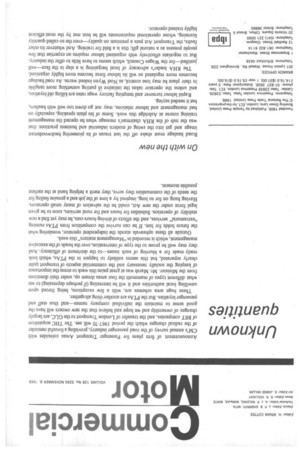Unknown quantities
Page 27

If you've noticed an error in this article please click here to report it so we can fix it.
Announcement of firm plans for Passenger Transport Areas coincides with CM's annual survey of the road passenger industry, providing a forceful reminder of the radical changes which the period 1967-70 will see. The THC acquisition of BET companies, and the transfer of London Transport to the GLC, are largely changes of ownership and we hope and believe that the new owners will have the good sense to maintain the individual company names—and thus staff and passenger loyalties. But the PTAs are another thing altogether.
These huge area schemes are, with a few exceptions, being forced upon unwilling local authorities and it will be interesting (if perhaps depressing) to see what different types of mammoth the four areas dream up, under their directions from the Minister. Mr. Marsh was at great pains this week to stress the importance of keeping the socially necessary and the commercial aspects of transport quite clearly separated, but this seems unlikely to happen in the PTAs, which look ready made for a blurring of such issues—to the detriment of efficiency. And they may well be prone to the type of intervention, over the heads of the executive management, which is recorded in "Management matters" this week.
Outside all these upheavals stands the independent operator, wondering what the future holds for him. If he can survive the competition from PTAs running "extramural" services, and the effects of driving-hours cuts, he may yet find a new stability of operation. Subsidies for buses and for rural services, soon to be given legal force under the new Act, could be the salvation of many small operators. Having hung on for so long, inspired by a love of the job and a genuine feeling for the needs of the communities they serve, they merit a helping hand at the earliest possible moment.
On with the new
Road haulage must shake off the last traces of its pioneering backwoodsman image and get into the swing of modern industrial and business practices: that was the nub of the RHA chairman's message when he opened the management training course at Ashridge this week. Some of his plain speaking, especially on bad management and labour relations, may not go down too well with hauliers, but it needed saying.
Rapid labour turnover and tempting factory wage rates are killing old loyalties, and unless the operator takes the initiative ifi putting something more tangible in their place he may lose control, as Noel Wynn indeed warns. As road haulage becomes more regulated so will its labour force become more highly organized.
The RHA leader's advocacy of local bargaining is a slap in the face—well justified—for the Wages Council, which seems to have little to offer the industry. But to negotiate effectively with organized labour requires an expertise that few people possess as a natural gift; this is a field for training. And whatever its other faults, the Transport Act puts a premium on quality—even the so-called quantity licensing, whose operational requirements will be best met by the most efficient highly trained operator.




























































































































































